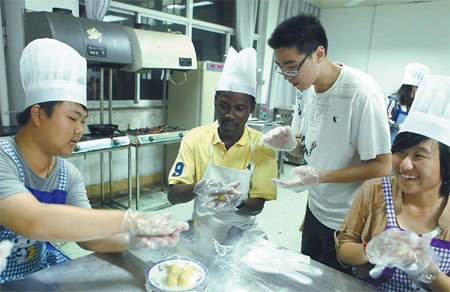Traditional festivals and celebrations have helped peoples from different countries and cultures come closer. But is this historical fact applicable to today's world? Yes, says a Chinese scholar based in Nairobi.
Experiencing Chinese festivals, like Mid-Autumn Festival, will help African people have a better understanding of Chinese philosophy and culture, which in turn will enhance people-to-people communication between the two sides, says Sa Dequan, dean of the Confucius Institute at the University of Nairobi, Kenya. "Language is the direct carrier of a culture, but festivals offer a more vivid description of a society."
"Misconceptions and cultural conflicts will gradually vanish," Sa says, "once mutual understanding" between people on the two sides is established.
 |
|
Chinese students teach their classmate from Ghana how to make mooncakes at the Jiangsu University in Zhenjiang, East China's Jiangsu province, on Sept 27. Xu Wei / for China Daily |
Sa says that in his institute lectures, he tends to introduce students to Chinese culture and traditions in a more localized and integrated way. For example, he compares Chinese costumes to local ones to explain certain common cultural traits. "This makes it easier for them to understand that we are not imposing our culture on them." It is important to share the common elements while respecting differences among cultures. "If food is what locals are interested in, we will introduce them to mooncakes and the stories behind them," he says.
By learning about and experiencing Chinese festivals such as Mid-Autumn Festival, African people will realize that they share a lot of values with the Chinese community here, says Phillip Mgere Omollo, a former student of the Confucius Institute. "We know the festival is the second biggest in China for family reunion, and it reminds us of our family gatherings back home."
With the dramatic increase in the number of Chinese in Africa in recent years, Mid-Autumn Festival has become even more special for Chinese expatriates, and eating mooncakes is one of the ways they can celebrate it.
Niu Naizhi and his wife Hou Xuan run a cafe and restaurant in central Nairobi. The first 1,000 mooncakes they made were lapped up by Chinese living in the city 20 days before the festival.
Mooncake is representative of the festival. That's why the festival is also called Mooncake Festival. For Chinese living thousands of miles away from home and family, a slice of mooncake can be a soothing relief, though it can also make them more homesick.
"Most of my clients are Chinese companies and organizations. They were happy with my mooncakes last year, so they placed bigger orders well ahead of time this year," Niu says. This is the third year that he is making mooncakes, whose sales jumped from 1,000 in 2010 to 3,000 last year.
Apart from Niu and Hou's Coco Lounge, several other Chinese bakeries also sell mooncakes in Kenya. The cakes come with traditional tastes and fillings made from yolk, lotus seed paste, beans and nuts. The bakers here, however, avoid using meat fillings, a favorite in South China, because it is difficult to preserve them without additives.
Although some materials, such as lotus seed paste, are very difficult to get here, Hou is trying to use other available materials to satisfy her customers. "We can find most raw materials for various fillings, such as black bean for sweetened bean paste and nuts for wu ren mooncakes, in local markets," she says. "We found wu ren mooncakes, which normally contain five types of nuts, tasted better when we used local sesame and cashew nuts."
Last year, some African people mistook the mooncakes displayed on shelves for Chinese-style chicken pies because they had not heard of the traditional Chinese cake, she says. "For us, selling mooncakes to locals is more like selling Chinese culture to foreigners we also have to tell them related stories and the importance in China of eating mooncakes."
An estimated 5 million Chinese live in Africa, and most of them are businesspeople and workers. They normally go home once or twice a year and not necessarily during festivals, so a gathering with colleagues and friends during festivals has become a much anticipated event.
"Gatherings of overseas Chinese, especially Chinese living in Africa, a continent they had little connection with or knowledge of in the past, give them a chance to get closer to each other," says Sa Dequan. Such people have stronger community feelings, which bring back common memories connecting them with home.
"We need a gathering to celebrate this festival of reunion because our life outside China is simple and sometimes boring," says Sun Bin, who has been working for a construction company in Nigeria for more than four years. "Red lanterns and family reunion are a bit far from our reality, but a slice of moon cake is necessary and possible to get," he says. "It's a bitter-sweet moment for us."
lilianxing@chinadaily.com.cn
